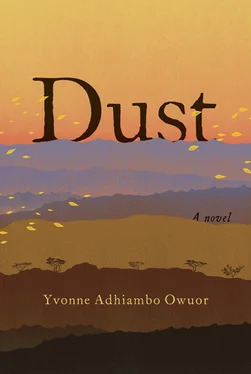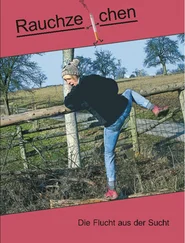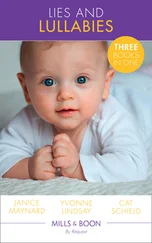The vines thrived.
Neighbors would call in to exclaim at the sproutings and plot their own wineries. They had already sized Hugh and Selene up and found them acceptable. An exhilarating beginning, full of hard work, experiments, dreams, plans, building, borrowing, and always starting again. Genial neighbors, the Thompsons: middle-class accents, plump, proper, Anglican, and polite. They had named their four children after animals, rivers, and trees: Topi, Oryx, Tana, and Acacia. They played backgammon, listened to Wagner, and wondered what other crops might take in this glorious land. Selene drank down glasses of champagne mixed with Guinness, and later, with Hugh, she laughed at the proper Thompsons and their untamed children.
After the rains, at their five-course dinner, Selene asked, “Wouldn’t it be lovely to have a child?”
Hugh had leapt across the table, knocking over the flower vase to land on her lap, his arms around her, clinging. “A son! My son!”
The first of Hugh’s “my”s.
Kenya was seeping into Hugh. His eyes had deepened, gone grayer, bolder, older. His cheeks were sunken, contoured, scarred, tinged with heat, his skin mottled. He laughed much louder, head thrown back.
Selene watched him.
Uncontained .
In time, whatever Hugh desired, he touched and claimed.
The houseboy: my Kavirondo.
The Waliangulu hunter: my tracker.
The cook: my mpishi .
The all-purpose repairman: my Indian fundi.
The boatman: my Lamu oarsman.
The dead elephant: my trophy.
Kenya: my country.
Selene: my wife .
One day, Hugh told her, “Darling, James Thompson says he’ll introduce us to the Colfields over at the Muthaiga Country Club. They can present our names for membership.” He beamed at Selene.
No , she prayed.
“Civilized company to keep, good for us,” said Hugh.
“Kenya,” declared Hugh one afternoon as he bounced into the house, returning from one of his spontaneous bush forays, and peeling off rain-dampened clothes, “Maasai. Means ‘ancient place of eternal purpose.’ ” He paused to point to an invisible space beyond the lake. “My Mkamba told me that ‘Kenia’ means gleaming substance. Like jewels, darling, though my tracker — odd chap — did contend that ‘Kenya’ was a word for ‘ostrich.’ But think, what a delectable convergence is our Kenya, dear, eternity glitters. As we shall.”
Yes, Hugh .
Selene sought refuge in decorating the home, adding throws, changing wall colors, surrounded by the servants who kept the rhythm of the day ticking.
Mwihaki, the maid.
Karanja, the gardener.
Noormohamed, the head cook, whose shepherd’s pies were of legendary repute.
Lisabeta, the assistant cook.
Linus, the kitchen toto, who synchronized his moods to Selene’s signs of pleasure or displeasure.
Lazaro Agwaro, houseboy, who had been a signal man in Burma.
“Boy, what was Burma like?”
“Hard, memsahib.”
“What did you do?”
“Nothing good, memsahib.”
“What did you see?”
“Bad things, memsahib.”
Penina, ayah and housekeeper, employed in anticipation of children-to-come, was still underutilized.
Two Labradors.
One feral cat.
A mongoose.
One Sykes’s monkey.
A troop of colobus monkeys.
Several duikers.
Five giraffes.
And Hugh.
Selene started to call herself a collector . Picking up and fitting pieces and things to life. She also changed. Head tilted, eyes lucid, she would listen, even to concealed messages in tapping fingers, and inhale a truth, which she stored for later use, in her dreams.
An unexpected massive storm rode into Naivasha over Easter, three years later, expanding the lakeshore. It had started as a spitting, backlit gray cloud. It blasted the landscape for five weeks nonstop. Selene and Hugh waited, one of their infinite Kenya waitings. Hugh set up an easel on the porch facing the lake and imagined the temper of the storm in, over, within the lake, in fierce colors and shades. A column of vodka and gin bottles memorialized this interlude. Then they watched the vines rot. Some hardy stems loitered but eventually turned feral.
Uncontained .
It should have been paradise. Selene had asked, “Hugh, what do we do now?” It was sensible to return to England.
“Start again!” said Hugh, guffawing. “Bloody good storm, what?”
Selene deflated.
He can no longer see the small things .
Resolution. She would outwait this country.
The tempest unshackled Hugh, and he roamed deeper territories. Safari after safari, and an assortment of guns entered the house, as did a parade of slaughtered creatures — heads, skins, tusks. All those things they had never needed until they came to Kenya.
Selene abhorred the look of dead animals. Hugh the predator made her nervous. She decided to stay behind in Naivasha to wait out Hugh’s hunts.
The first birth: a girl, at Nanyuki Cottage Hospital — a late-term miscarriage. Selene named her Elise, and when they had taken her away, she wondered how a mere turn in a footpath could lead to a woman lying on her back alone in a hospital bed staring at a stark white high-vaulted ceiling.
I’m becoming smaller .
Hugh! Selene called out before covering her mouth, crushing need into tears. Hugh was, as always now, somewhere else in Kenya. She had stopped asking where he was going, with whom and why. Selene checked herself out of the hospital. Traveled overnight back to Naivasha, where, the next day, Penina administered chicken soup and a green soup made of unknown ingredients, until her body recovered. Selene started to garden, planting dahlias. She tilled the land and purchased a pair of long-haired milk-producing goats. They thrived and produced more goats. Every night she dreamed of the stark, honest blast of an English winter.
Hugh came home hauling the tusks of four dead elephants. “Where’s the baby? What is it?”
“ She died,” Selene says. “Tea, dear?”
“Thank you. Died? Oh, bugger!”
For five seconds Selene hoped Hugh would cry. He wrestled a torment, which puffed and then deflated his face, and said, “Was looking forward to raising a real Kenya lad. Must not wallow, though. We’ll try again.”
“Yes, dear. Scones?”
Refuge in caricature. Play-acting.
She was good at this.
Selene waited.
The ferment was not long in coming.
Restlessness.
She plucked news from the frothing landscape.
National happenings.
A death.
Mission-reject Lucas Pkiech in a battle with British forces. Postwar dinis . Hugh relished the phrase. Intimate details of battle, as if he had been there. “The color of blood drying in Kenya’s sun is more intense than at other battlegrounds, darling. Copper and something in between.”
Lovely . Selene winced. How do you know all this? She clutched the battle scars of her womb, their empty bounty. Hugh mixed copper on his palette. Color of blood from a hemorrhaging miscarriage, one spectacle Hugh had missed.
The duke of Gloucester came and baptized Nairobi a city.
“Must go home,” she told Hugh.
“You are home, darling. Start a craft, get busy. Cheer up!”
“Must go home.” Selene’s arms clasped her body. Her voice sounded whiny, and Hugh turned his head, eyes slit, mouth firm.
Nothing more said.
Yet she prevailed.
Selene landed in London. Another damp and disappointing spring was under way. She and her sister watched black swans glide by on a park’s pond. Her two nieces played with their brand-new brother. Pieces of grass smeared Selene’s fingers. Selene brought the fingers to her nose and inhaled home. Ached. Hugh’s absence was a sorrow.
Читать дальше











